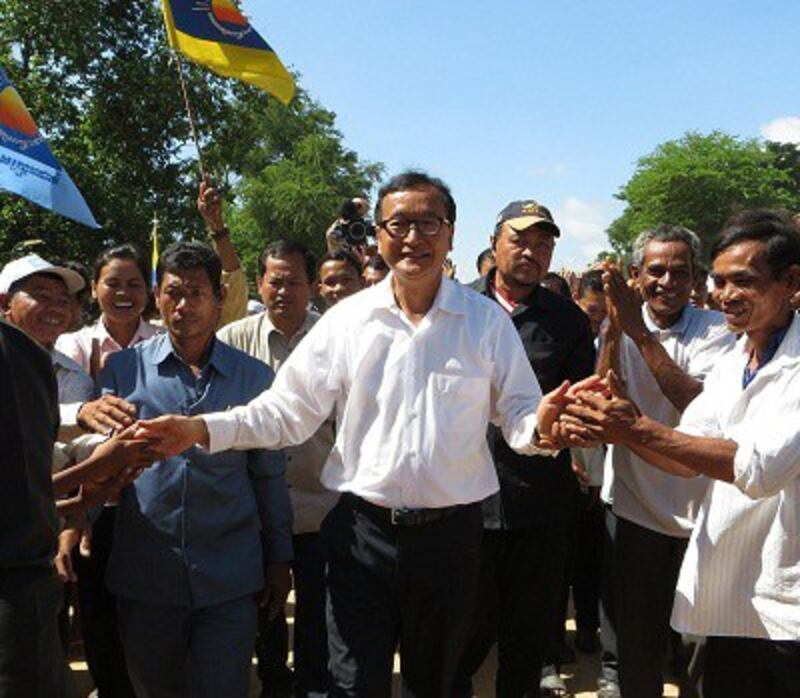Talks between Cambodia’s ruling and opposition parties aimed at investigating widespread irregularities that marred hotly contested national elections have broken down, with the opposition set to hold a mass demonstration demanding U.N. intervention in the dispute.
The Cambodia National Rescue Party (CNRP) walked out on weekend talks with Prime Minister Hun Sen’s ruling Cambodian People’s Party (CPP) and the National Election Committee (NEC) after its demands to include the U.N. in a proposed panel that would investigate irregularities in the disputed July 28 vote were rejected.
The two parties, which have both claimed victory in the polls, and the government-appointed NEC, which manages the country’s elections, had met on Saturday to discuss a joint probe into CNRP’s claim of mass irregularities in the vote.
A day later, the CNRP and NEC said the talks could go no further, as the proposal to include the U.N. has been rejected by the election body.
The CNRP had insisted that any joint investigation committee must comprise officials from the party as well as the CPP, local civil society groups, and national and international observers, with the United Nations acting as an arbitrator.
“We want the United Nations to act as the referee and the NEC to act as the coordinator,” CNRP spokesman Yim Sovann told RFA’s Khmer Service.
"We can't allow the same people who created the problem to resolve the irregularities,” he said, blaming the CPP and the government-appointed NEC for a series of irregularities, including the delisting of more than a million people from the voters’ list.
NEC 'regret'
NEC Secretary General Tep Nytha said he was disappointed that the talks had failed, as the committee could not accept the CNRP’s request.
He said that the NEC will move ahead with an investigation on its own.
"The NEC will continue to do the work,” he told RFA.
A statement on the committee’s website said a meeting planned for Sunday among the CPP, CNRP, and NEC “could not take place due to the fact that the CNRP estimated that the proposed composition of the ad hoc committee was too narrow and contrary to the wishes of the CNRP.”
“The NEC regrets that its attempt [to resolve the issue over the irregularities] could not succeed,” it said.

The CPP claims its review of results showed that it has secured 68 seats and the CNRP won 55, while the CNRP maintains that based on its own calculations, it won 63 seats and the CPP took 60. The NEC has not declared the official results.
CNRP chief Sam Rainsy and deputy chief Kem Sokha have called for a mass demonstration in Phnom Penh’s Freedom Park on Tuesday to demand the election irregularities be addressed with U.N. oversight.
"We must protect our victory. We must not allow dictators to continue another five years,” CNRP President Sam Rainsy said at a rally in Prey Veng province, clearly referring to Hun Sen, who has ruled the impoverished country for 28 years and has faced persistent accusations of trampling on human rights and silencing political dissent.
Hun Sen, Southeast Asia's longest-serving prime minister, has said that his CPP will move to convene the National Assembly and establish the new government by the end of September even if CNRP's lawmakers refuse to accept the CPP-produced results that were endorsed also by the NEC.
But observers have challenged the legality of any such move, saying even with all 68 seats that it claims the CPP will lack a quorum of 120 lawmakers needed to open a new session of the National Assembly, which holds the key to endorsing any new government.
CPP to take ‘all 123 seats’
CPP senior party member Chheang Von said Monday that if the CNRP boycotts the assembly, the CPP will take over its seats.
He said Cambodia’s laws state that when lawmakers of one party boycott the National Assembly so that it cannot convene, the seats belonging to that party are divided among the other parties in the assembly—which in this case is only the CPP, he told RFA’s Khmer Service.
“It is not necessary to have at least 120 lawmakers for the first assembly session," he said.
Legal experts and CNRP officials, however, contend that in order to have a valid government and assembly, the CNRP lawmakers must participate in the session.
"Article 76 of the Constitution says the assembly must have at least 120 lawmakers," CNRP senior party member Son Chhay told RFA, adding that a July 2003 decision by the country’s Constitutional Council had reaffirmed the rule.
Reported by RFA’s Khmer Service. Translated by Samean Yun. Written in English by Rachel Vandenbrink.
